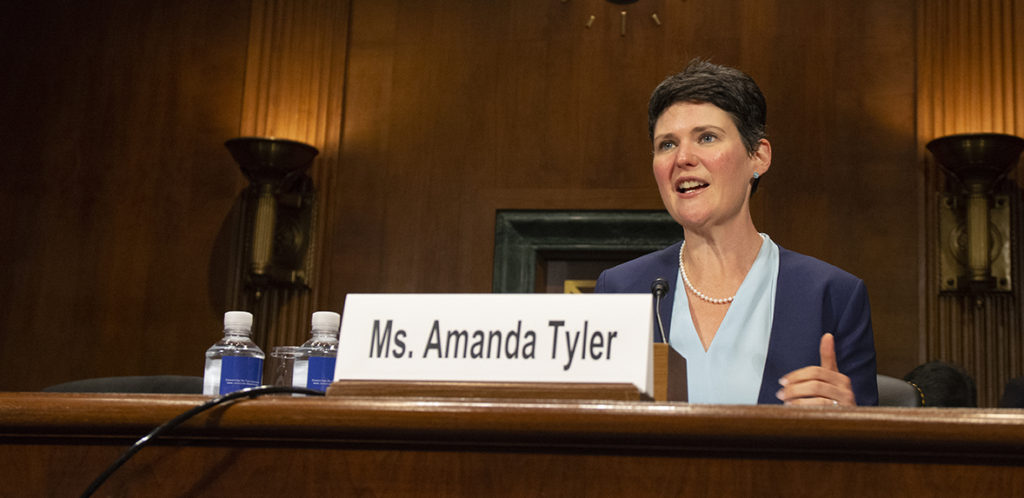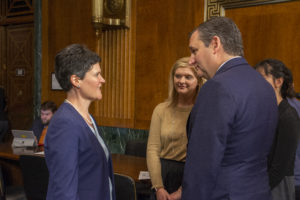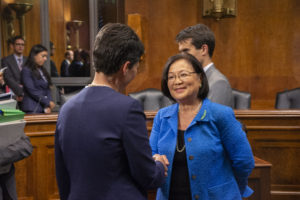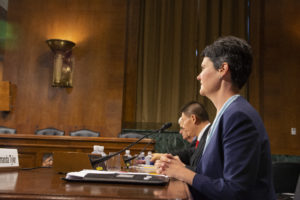 By Cherilyn Crowe
By Cherilyn Crowe
“Maintaining the United States’ strong leadership in defending religious liberty around the world requires that we attend to challenges at home as well as abroad.”
BJC Executive Director Amanda Tyler relayed that message to members of Congress on October 2. Testifying before the Senate Judiciary Committee’s Subcommittee on the Constitution, Tyler spoke boldly about the challenges to our first  freedom at home and abroad.
freedom at home and abroad.
Spectators packed the room to attend the hearing, titled “Threats to Religious Liberty Around the World.” Sen. Ted Cruz, R-Texas, chairs the subcommittee and presided over the hearing, alongside ranking member Sen. Mazie Hirono, D-Hawaii. “Since our founding, the United States has been a world leader in protecting religious liberty,” Tyler said during the first portion of her testimony. “The American legal tradition protects religious liberty in a distinct way that has served this country well.”
Tyler spoke of the importance of Article VI of the Constitution, which provides that “no religious test shall ever be required” for office in the United States, and she discussed the importance of both of the protections for religion in the First Amendment — the Free Exercise Clause and the Establishment Clause. Together, they ensure that living in America is not contingent on one’s theological views or religious affiliation.
Tyler outlined five threats in our current climate that demand attention.
“First, we must restore our reputation in the wake of President Trump’s statements against Muslims and the travel ban policy,” she said. “While the U.S. Supreme Court upheld the constitutionality of the administration’s third iteration of the travel ban, the harm to religious liberty remains since the original order sent the un-American message that only certain faiths are welcome here.”
Tyler then focused on the danger to religious liberty posed by the acts of individuals in word and deed. “We must acknowledge and address violence and rhetoric directed against religious minorities in the U.S. and abroad,” Tyler said, pointing out that the rise in hate crimes against religious minorities is both a global and domestic issue.
“Third, we must reject overreaching on religious liberty exemptions, which threatens widespread support for religious freedom,” Tyler said. “Some assert a right to exemptions of unprecedented breadth without recognizing the competing government interests or effects on third parties that must necessarily be considered in a pluralistic democracy. These represent a growing misunderstanding — and sometimes willful distortion — of the Free Exercise Clause.”
During her fourth point, Tyler turned to the importance of religious protections for social service beneficiaries, asking Congress directly to address recent backtracking on those key protections. Tyler said that anyone seeking government-provided services from an organization partnering with the government should get a referral to receive the service elsewhere if the person objects to the religious nature of the organization. And, those in need of services should receive written notice of that protection. “In an Executive Order President Trump issued in May of this year, he struck these notice requirements,” Tyler reminded the senators. “Congress should consider ways to restore these protections through legislation to ensure that no American is forced to choose between having her needs met and practicing — or choosing not to practice — her faith.”
Finally, Tyler reminded all in attendance to beware of the use of the term “religious liberty” to promote bad policy. She shared the example of President Trump’s campaign to destroy the “Johnson Amendment,” which is a shorthand term for the provision in the tax law that separates partisan campaigning from 501(c)(3) organizations. “Every religious denomination to address the issue is united in their support for the current law,” Tyler said. “Changing the law would fundamentally change their nonpartisan character, distract them from their core mission and threaten their independence.”
Two others were called to testify at the hearing. Dr. Thomas Farr, president of the Religious Freedom Institute in Washington, D.C., focused on the need to protect the free exercise of religion. Also testifying was the Rev. Dr. Bob Fu, founder and president of the ChinaAid Association based in Midland, Texas. Fu spoke of alarming trends in China restricting religious freedom and shared his personal story of persecution and imprisonment when he was a house pastor in China.
You can watch a video of Tyler’s testimony online or listen to it as a podcast. Click here to watch the entire hearing.
This article originally appeared in the November/December 2018 issue of Report from the Capital. To view the PDF online, click here.




